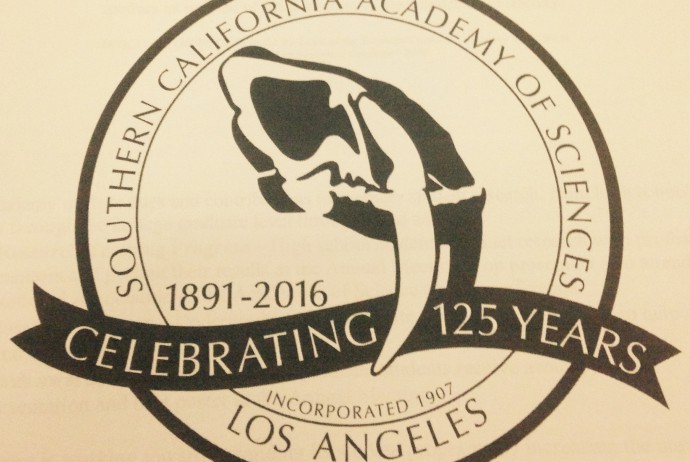Next-generation sequencing has allowed us to characterize cetacean gut microbial communities and discover surprising similarities to the microbiomes of terrestrial herbivores and carnivores.
I am thrilled to announce the publication of our paper on the whale gut microbiome in Nature Communications.
By sequencing the bacterial genomes contained in whale fecal samples, we explore the gut community of baleen whales and its functional potential. We find a remarkable ‘fusion’ microbiome that, while highly diverged overall from that of terrestrial mammals, contains functional elements characteristic of both terrestrial carnivore and terrestrial herbivore gut microbiomes. We find evidence to support the hypothesis that whales (which are descended from herbivorous terrestrial mammals, but are carnivores, eating small crustaceans and small fish) may use foregut fermentation to break down their food, much as ruminants do. In particular, the need to break down recalcitrant chitin in the exoskeletons of krill and copepods seems to have led the whale gut community to evolve the ability to bind and degrade chitin in the exoskeletons of krill and copepods.
This paper represents over four years of work carried out by Jon Sanders, myself, Joe Roman, Jarrod Scott, David Emerson, James McCarthy and Peter Girguis.
The study started as my senior thesis as an undergraduate at Harvard. In 2011, Dr. Roman and Dr. McCarthy were planning to collect right whale fecal samples in the Bay of Fundy to determine whales’ role as a ‘nutrient pump’ (bringing nitrogen up from the deep water where they feed, to the surface where they defecate), and I was eager to carry out marine fieldwork on a system that had always fascinated me. Given my interest in genetics, I wanted to add a molecular component to the research. Guided by Dr. McCarthy and Dr. Roman, we thought about exploring the whale gut microbiome. We teamed up with Dr. Girguis and Jon Sanders and worked together to conceive the microbiome study.
Dr. Roman, our colleague John Nevins and I traveled to Grand Manan in New Brunswick, Canada to carry out the fieldwork. We worked with Drs. Heather Koopman and Andrew Westgate at the Grand Manan Whale and Seabird Research Station to collect the fecal samples from right whales using fine mesh nets. We would stay on the water all day to search for “surface active groups” of right whales, then wait nearby until we smelled or saw the whale poop float to the surface in large brown clumps. We would then scoop it up and freeze a portion for genetic analysis.
I extracted DNA from the fecal samples and carried out an initial survey of the gut community using high throughput DNA sequencing. Jon Sanders and Peter Girguis advised me as I carried out initial analyses and found that the whale gut community is highly diverged from that of terrestrial mammals. We were excited by this result, and after I gradated from Harvard, Jon expanded the dataset to include metagenomic data and he and I worked with Dr. Emerson and Dr. Scott on the analyses to characterize the microbial community and its functionality.
Working with this amazing team of researchers to conceive such an exciting study was an unforgettable experience as an undergraduate and young researcher.
-

-
A surface active group (SAG) of right whales
-
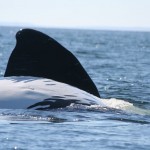
-
Female right whale on her back
-
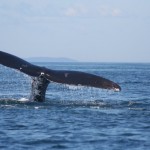
-
Diving right whale
-
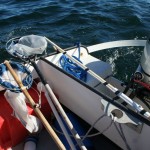
-
Collecting Gear
-
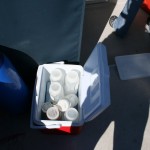
-
Fecal Samples
-

-
Photo Credit: John Nevins

